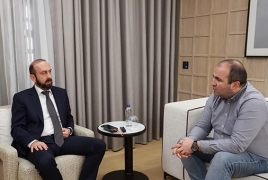
During the April 11–13 diplomatic forum in Antalya, Armenian Foreign Minister Ararat Mirzoyan said the event provided a useful platform to engage not only with Turkish officials but also representatives from other nations. He especially highlighted the South Caucasus panel discussion, attended by the foreign ministers of Azerbaijan and Georgia, as reported in by CivilNet.
Mirzoyan said he met with Turkish Foreign Minister Hakan Fidan and Azerbaijani Foreign Minister Jeyhun Bayramov to discuss bilateral and regional matters.
Speaking on Armenia-Turkey normalization, Mirzoyan stated that the prospects for cooperation between the two countries "go beyond merely establishing minimal relations." Some agreements have already been implemented, such as those concerning airspace usage. Infrastructure work has also been done at the Margara-Alican border crossing. However, certain arrangements—such as opening the border to third-country nationals—remain unfulfilled.
According to Mirzoyan, Turkey is tying some agreements to progress in Armenia-Azerbaijan relations, while Armenia believes that advances with Turkey can positively influence Armenia-Azerbaijan normalization.
He noted mutual understanding exists with Turkey regarding wider opportunities for cooperation: “Both sides see potential not just for minimal diplomatic relations but also for substantial interstate trade, transit opportunities, and joint energy projects. On some international political issues, particularly within the Middle East agenda, our positions are sometimes much closer than expected. So yes, cooperation is possible—and not just minimal or symbolic.”
While acknowledging differences in perception, Mirzoyan emphasized that dialogue continues and Armenia remains committed to a constructive approach in normalizing relations with both Turkey and Azerbaijan.
He also noted a key milestone with Azerbaijan: the completion of the draft peace treaty and Armenia’s readiness to sign it. He argued that even if not all issues are resolved in the treaty, signing it would activate a commission that could address emerging disputes. Armenia advocates moving to the signing phase without delay.
Azerbaijan has imposed two preconditions: dissolving the OSCE Minsk Group and amending Armenia’s constitution. Mirzoyan stated that Armenia believes the Minsk Group will become obsolete upon the treaty's signing and is ready to simultaneously sign a document declaring its termination. On the constitutional issue, he asserted that Armenia has no territorial claims on Azerbaijan, unlike Azerbaijan’s constitution, which includes such claims.
Mirzoyan added that before ratification, the peace treaty would be reviewed by Armenia’s Constitutional Court, and based on past decisions, he expects a favorable ruling.
While the two sides have yet to align on mutual positions, Mirzoyan stressed the need to maintain dialogue to avoid deadlocks.
Regarding unblocking regional transport links, he revealed that Armenia proposed reciprocal rail access under full bilateral sovereignty using modern technologies and security mechanisms. This proposal received a somewhat positive reaction, but Azerbaijan has recently shown a cooler stance.
In Antalya, Mirzoyan took part in a diplomatic forum, met separately with Azerbaijani Foreign Minister Jeyhun Bayramov, and joined a panel with the foreign ministers of Azerbaijan and Georgia.

